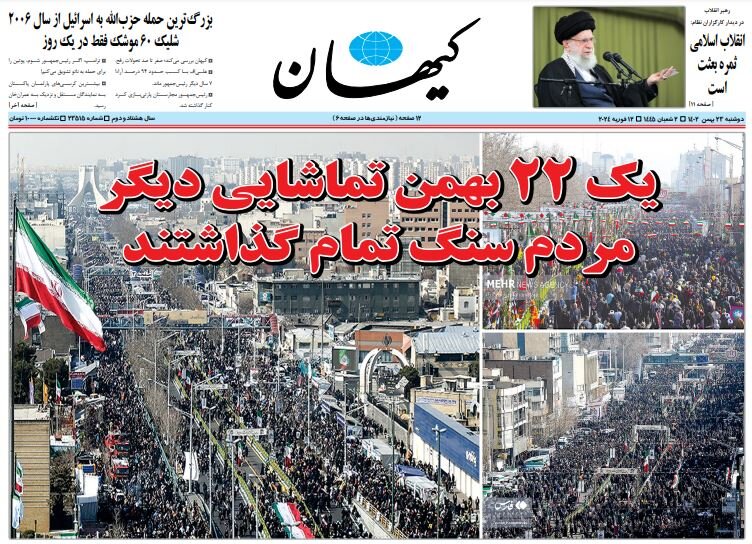The Gaza war increased regional unity

TEHRAN - In a note, Kayhan addressed the unprecedented alliance in the region and wrote: While the Western governments of the region have not shown much effort to stop the Gaza war, Iran and the forces around it have demonstrated the face of regional leaders and the main supporters of Palestine.
The Houthis have been able to disrupt shipping through the Bab al-Mandeb Strait despite the attacks of the United States and England. The war in Gaza has brought about greater unity in the Muslim world than at any other time in recent decades. America's unconditional support for Israel has further isolated Washington and reduced its popularity in the region, and currently growing support in the region for resistance against the West and Israel is being formed. As a result of the mistakes made by their enemies in Israel and the West, Iran and its allies are likely to gain more influence and leverage in the region. For the U.S., the military power may be satisfactory but Washington cannot stop the escalation of tension in the region except by establishing a ceasefire in Gaza, ending the occupation and establishing a stable Palestinian government.
Hamshahri: Iran is on the path of progress
Hamshahri devoted its headline to the important and strategic achievements after the victory of the Islamic Revolution and said: The 45th anniversary of the victory of the Islamic Revolution is while according to statistics and surveys, today Iran has achieved important and strategic achievements in many fields. Iran in addition to being considered a regional power in the Persian Gulf and the Middle East, is competing with the superpowers of the world in many fields. During the past decades, cruel foreign sanctions created obstacles in the country's progress in various indicators, but reliance on the power of domestic experts caused Iran to be among the world's leaders in many fields, from scientific and academic to health, military, space, nuclear, etc. All this is while the enemies and opposing currents have tried to hide the achievements of the Islamic Republic from public opinion in various ways with large political and media investments in recent years and to denigrate the country's brilliant record by highlighting some deficiencies.
Sobh-e-No: The popular revolution plays the role of deterring threats
Sobh-e-No devoted its editorial to the glorious presence of the people on the victory of the Islamic Revolution anniversary (11 February) and wrote: One of the most significant differences between the Islamic Revolution and other great revolutions in the world, such as the French Revolution or the Russian and Chinese Revolutions, is the popular dimension of this revolution. According to Charles Kurzman, a professor of sociology and West Asian studies at the University of North Carolina and the author of the book "Unthinkable Revolution in Iran", "In terms of the number of people who participated in the Iranian revolution, it is one of the biggest uprisings in the history of the world." Despite the enemy's non-stop efforts to discourage and disappoint the people, the amazing attendance of the people in the celebration of the victory of the revolution is a miracle. This presence and participation in the elections have a strategic aspect and an operational aspect. Its strategic aspect is to show national unity, generate power and promote national security, and its operational aspect is to commemorate the anniversary of the revolution with high popular support. This presence showed the national power and this power will lead to the promotion of national security, which plays an undeniable role in deterring threats.
Javan: An inevitable interaction with Tehran
In an analysis, Javan discussed Iran's role in the future decisions of the U.S. in its policies in the Middle East. It wrote: William Burns, the director of the CIA, has considered interaction with Iran to be the key to the security of Israel and the Middle East region. America and its regional allies have always tried to deny the role and influence of the Islamic Republic of Iran in the developments and trends of the region, but they failed. Moreover, the axis of resistance in the region, from the Hezbollah movement in Lebanon to the Ansarullah movement in Yemen and the resistance groups in Iraq, each has struggled with Israel and America to stop the attacks on Gaza. The sum of these issues and America's claims about Tehran's encouragement and support of proxy groups in the region show that despite ignoring and even denying Iran's influence in regional developments, especially the security of West Asia, Washington is forced to interact with Iran to investigate the issues of this region. In other words, the United States will eventually have to consider Iran's demands, considerations and interests to create stability and peace in the region and stop hostile actions against Tehran and the axis of resistance.
Leave a Comment